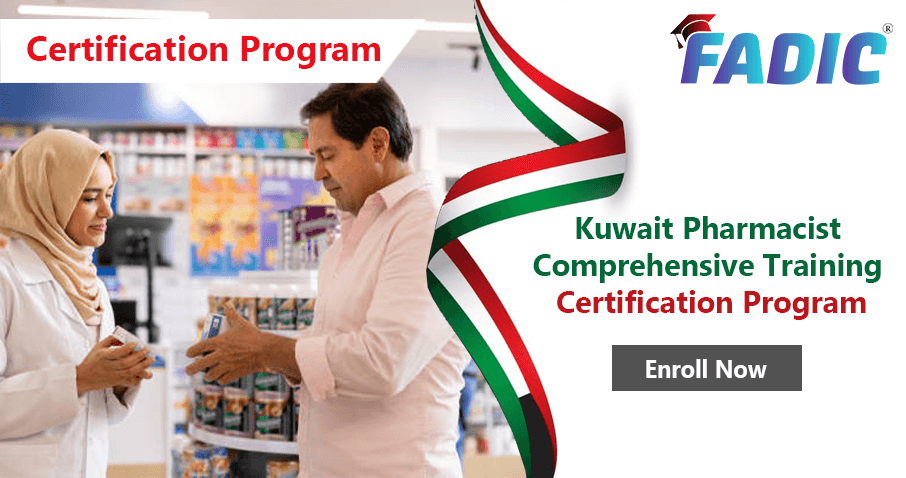
Why Enroll in the Kuwait Pharmacist Certification Program: Comprehensive Training?
Enroll in the Kuwait Pharmacist Certification Program for a comprehensive and region-tailored curriculum that covers essential pharmacy topics from Toxicology to Pharmacy Law and Ethics. Enhance your CV, gain practical insights, and network with professionals while enjoying flexible learning. This course will equip you with relevant, up-to-date knowledge, ensuring you stand out in the Kuwaiti pharmaceutical landscape, and substantially improve your ability to provide exceptional patient care. Take a step towards excellence and advancement in your career with this invaluable training program.
Overview
Kuwait MOH Pharmacy Exam Training & Preparation Course

Kuwait MOH Pharmacy Exam Training & Preparation Course
- Welcome to the Ultimate Kuwait MOH Pharmacy Exam Training Course!
Get ready to excel in your journey towards success with comprehensive training, expert guidance, and essential resources tailored specifically for the - Kuwait Ministry of Health (MOH) Pharmacy Exam. Let’s achieve your goals together and build a strong foundation for your pharmacy career in Kuwait!
Why Choose This Course?
- This in-depth course covers a range of essential topics, ensuring you’re well-equipped in various areas of pharmacy practice. From Toxicology to Pharmacy Law and Ethics, this course has got you covered. Take a step towards excellence by enrolling today!
Syllabus Breakdown
- Patient Counseling: 30%
- Medication Safety: 30%
- Drug Information: 25%
- Antimicrobial Stewardship: 30%
- Research: 20%
- Pharmacotherapy: 20%
- Over-the-Counter Medication: 20%
- Pharmacy Calculation and Compounding: 15%
- Pharmacokinetics: 5%
- Pharmacoepidemiology: 5%
- Pharmacoeconomics: 5%
How Does This Course Empower You?
- Gain practical insights into patient education, pharmaceutical care, medication safety protocols, and pharmaceutical calculations and compounding. Prepare to manage over-the-counter medications efficiently and uphold pharmacy law and ethics in your practice.
What Are You Waiting For?
- Don’t miss this opportunity! Secure your place in this exceptional course and ensure your service stands out for its accuracy, efficiency, and excellence!
Subscription Packages
| Package | Duration | Price (£) |
| 15-Day Access | 15 Days | 105 GBP |
| One Month | 1 Month | 160 GBP |
| Two Months | 2 Months | 220 GBP |
| Three Months | 3 Months | 330 GBP |
| Six Months | 6 Months | 500 GBP |
| Twelve Months | 12 Months | 600 GBP |
Enroll Now for the 12-Month Package!
- Opt for our 12-Month Subscription and get uninterrupted access to all course materials, mock tests, and exclusive features. Enroll Here
Looking for Shorter Packages? Contact Us!
- For shorter packages, reach out to our team directly via WhatsApp to get started.
- WhatsApp Support: Click Here to Chat
- Vaccines and Immunization Mini-Course
- Pharmacotherapy and Clinical Science Mini-Course
- Pharmacoepidemiology and Pharmacoeconomics Mini-Course
- Pharmaceutics and Pharmaceutical Calculations Mini-Course
- Check Now FADIC® E-Book Store in different specialties
Hashtags
1. #pharmacist, clinical pharmacist 2. #kuwait pharmacist vacancy
3. #pharmacist cv, pharmacy kuwait, #kuwaitpharmacistvacancy
4. #clinical pharmacy #KuwaitMOH
5. #pharmacy online, pharmacy kuwait
6. #pharmacist #clinicalpharmacist #pharmacistcv #pharmacykuwait
7. #clinicalpharmacy #pharmacyonline
If you have any inquiry, please contact WhatsApp.

-
1- Physiology | Immunology | Microbiology
- 1.1. Physiology Vs. Pathophysiology
- 1.2. Types of Immunity
- 1.3. Types of Antibody
- 1.4. 4 Types of Hypersensitivity Reactions
- 1.5. Microbiology Introduction
- 1.6. Gram-Positive Vs. Gram-Negative Bacteria
- 1.7. Staphylococcus
- 1.8. Streptococcus
- 1.9. Enterococcus
- 1.10. Acinetobacter
-
2- Pharmacology
- 2.1. Penicillin
- 2.2. Cephalosporins
- 2.3. Polymyxins
- 2.4. Tetracyclines
- 2.5. Aminoglycosides
- 2.6. Fluoroquinolones
- 2.7. Sulfonamides
- 2.8. Clinical Pharmacology Quick Guide (Book)
- 2.9. Module 2 (Info-graphics)
-
3- Toxicology | Antidote
- 3.1. Toxicology, Antidote and types of Toxicity
- 3.2. Adverse effects Vs Side effects
- 3.3. Drug-Drug Interaction
- 3.4. Black Box Warning Medications (Book)
- 3.5. Acetaminophen Toxicity
- 3.6. Digoxin Toxicity
- 3.7. Warfarin Toxicity
- 3.8. Heparin Toxicity
- 3.9. Methotrexate Toxicity
- 3.10. Medicines Side Effects (Flashcards)
-
4- Pharmacognosy | Dietary Supplements
- 4.1. Types of Vitamins
- 4.2. Vitamin B1- B2- B3
- 4.3. Vitamin B5 – B6 – B7
- 4.4. Vitamin B9- B12- C
- 4.5. Vitamin A- D
- 4.7. Vitamin E-K
- 4.6. Vitamins E- Guide (Book)
- 4.8. How Pharmacist use & Recommend Vitamins
- 4.9. Vitamin Patient Counseling & Education
- 4.10. Vitamin Case-Based Approach
-
5- Pharmaceutical Calculations for Pharmaceutical preparations
- 5.1. Pharmaceutics and Pharmaceutical Calculations
- 5.2. Drug Instability Causes
- 5.3. Drug Administration Route
- 5.4. Simple Guide for Drug Calculation
- 5.5. Equivalent Dose
- 5.6. Drug Concentration Units
- 5.7. Percentage Calculations
- 5.8. Dosage Calculations of Drug
- 5.9. Pharmacokinetic Equations and Calculations
- 5.10. How To Think Systematically In Calculations?
-
6- Pharmacokinetics | Pharmacodynamics | Pharmacogenomics
- 6.1. Pharmacokinetics Vs. Clinical Pharmacokinetics
- 6.2. Role of Pharmacist in Clinical Pharmacokinetic Monitoring
- 6.3. Basics of Pharmacokinetics
- 6.4. Basics of Pharmacodynamics
- 6.5. Therapeutic Drug Monitoring
- 6.6. Therapeutic Drug Monitoring List (E-Booklet)
- 6.7. Pharmacogenomics and Personalized Medicine
- 6.8. Gene Expression and Regulation
- 6.9. Example of Pharmacogenomic Drug Testing
- 6.10. Module 6 (Info graphic)
-
7- Sterile Vs Non-Sterile Compounding
- 7.1. Pharmacy Practice Management
- 7.2. Medication Storage
- 7.3. Non – Sterile Preparations
- 7.4. Compounding Sterile Preparations
- 7.5. Total Parenteral Nutrition
- 7.6. Evaluation of Medication Appropriateness
-
8- Pharmacoepiemiology | Economics
- 8.1. The Importance of Pharmacoeconomics
- 8.2. Cost-Minimization Analysis
- 8.3. Cost-Benefit Analysis
- 8.4. Cost-Utility Analysis
- 8.5. Cost-Effectiveness Analysis
- 8.6. Pharmacoeconomic Role
- 8.7. Application of Clinical Pharmacoeconomics
- 8.8. Pharmacoepidemiology
- 8.9. Primary Vs. Secondary Data Collection Sources
- 8.10. Pharmacoepidemiology in Pharmacy Practice
-
9- Drug Information, Biostatistics
- 9.1. PICO Question Examples
- 9.2. Drug Information, and Electronic Resources
- 9.3. Top 10 Ethical and Legal Issues in Drug Information
- 9.4. Basics of Biostatistics
- 9.5. Clinical Application of Biostatistics
- 9.6. Controlled Clinical Trial Evaluation
- 9.7. Phases of Clinical Trials
- 9.8. The 7 Tips for Managing a DIC
- 9.9. Drug Information Medical Resources Case Studies
- 9.10. Medication Therapy Management
-
10- Medication Management | Medication Error | Pharmacovigilance
- 10.1. Medication Management and Use
- 10.2. Essential Safety Requirements
- 10.3. Medication Errors
- 10.4. Adverse Drug Reactions
- 10.5. Pharmacovigilance
-
11- Evidence-Based Medicine | Research
- 11.1. Introduction of EBM
- 11.2. Ask, Acquire, and Appraise
- 11.3. Apply, and Assess
- 11.4. 7 Steps of Research Process
- 11.5. Write a Research Plan?
- 11.6. 12 Types of Research Design
- 11.7. Types of Data Collections
- 11.8. Ethical Issues in Clinical Research
- 11.9. Writing the Research Proposal
- 11.10. Clinical Practice Guidelines Tools & Resources (E-Book)
-
12- Patient Assessment | Counseling
- 12.1. Prescription Drugs Vs. OTC Drugs
- 12.2. OTC Regulations and Guidelines
- 12.3. OTC Medication Safety Patients Tips
- 12.4. OTC Safety Pharmacist Prescribing Tips
- 12.5. Pharmacist Role for The proper Selection OTC Products
- 12.6. Key Pharmacists Counseling Reminders to Patients OTC Products
- 12.7. Steps in Clinical Reasoning
- 12.8. Differential Diagnosis
- 12.9. Essential Guide to Community Pharmacy Practice
- 12.10. OARS Model Essential Communication Skills
-
13- Medication Safety | Quality Improvement
- 13.1. Medication Safety Among International Organization
- 13.2. Medication Safety Terms
- 13.3. Quality Improvement
- 13.4. Pharmacist as a Leader
-
14- Pharmacotherapy | Part 1
- 14.1. What is Pharmacotherapy?
- 14.2. Heart Failure
- 14.3. Anti-arrhythmia
- 14.4. Coronary Artery Disease
- 14.5. Dyslipidemia
- 14.6. Hypertension
- 14.7. Diabetes
- 14.8. Pharmacotherapy in Special Populations
- 14.9. Role of Pharmacist-led Pharmacotherapy
- 14.10. Module 14 (Info-graphics)
-
15- Clinical Science | Part 2
- 15.1. Communication Tips with CNS Disorders and Depression
- 15.2. Insomnia Patient Counseling
- 15.3. Anxiety Patient Counseling
- 15.4. Headaches Patient Counseling
- 15.5. Epilepsy Patient Counseling
- 15.6. GAD & PD
- 15.7. PTSD and OCD
- 15.8. REMS in Psychiatry
- 15.9. Most Popular Contraceptive Drugs (Article)
- 15.10. Module 15 (Infographics)
-
16- Vaccines | Immunization
- 16.1. Active Vs Passive Immunity | Vaccines
- 16.2. Vaccine Types: Inactivated Vs Live Attenuated
- 16.3. Contraindications & Adverse Effects
- 16.4. Vaccines Consideration in Special Population
- 16.5. Vaccines Storage
- 16.6. Vaccinations Needed Before You Travel & Hajj
- 16.7. Saudi MOH and CDC Immunization Schedules
- 16.8. Influenza Vs COVID-19 Vaccines
- 16.9. Pfizer-BioNTech COVID-19 Vaccine FAQs
- 16.10. Vaccines Questions & Answers
-
17- Regulatory Issues | Ethics
- 17.1. Principles of Biomedical Ethics
- 17.2. Ethical Dilemmas In Delivery of Patient-Centred Care
- 17.3. Ethical Dilemmas In the COVID-19 Pandemics
- 17.4. Pharmacist Ethical Code
- 17.5. Bioethics Definition
- 17.6. Kuwait Library (Books)
-
18- Pharmacy Practice Review
- kuwait Mock Test 11 (Quiz 60:00)
- Pharmacy Regulations (New!) (Book)
- Kuwait Pharmacy Made Easy (Book)
- Kuwait Pharmacy Revision Guide (Book)
- And Finally, Your Certificate…
- Kuwait Last Minute Pharmacy Review (Book)

 Log in
Log in Sign up
Sign up

